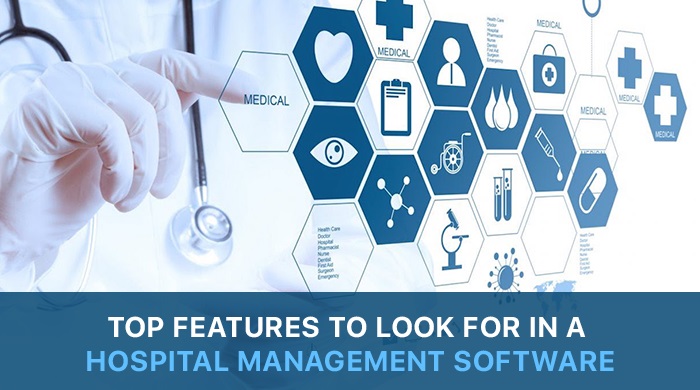The healthcare industry has seen a tremendous transformation over the last few decades due to the shift from traditional working models. This led to the rise of new streamlined, automated processes which rigorously helped the hospital staff and administration deliver enhanced medical care and services. This transformative phase gained significant speed during and after the COVID-19 pandemic when challenges associated with low staffing, poor infrastructure, the rising cost of care, staff health and safety, evolving patient expectations, etc., were seen globally. Due to these challenges, many healthcare institutions realized the need for better hospital management.
“It is unfortunate that administration has frequently lost sight of the fact that patient care is dependent upon the skill and attitude not only of the hospital personnel with whom the patient is in direct contact but also upon the skills and attitude of the many employees whom the patient may never get to see. Due to the growing awareness about exceptional healthcare services amongst the masses, hospitals all over the world are therefore under tremendous pressure to improve their patient care services,” says Gupta, J. D. in his book: Hospital Administration and Management: A Comprehensive Guide.
For this, hospitals are increasingly implementing digital tools and software, such as hospital management software, to automate workflows, counter the increasing burden on hospital staff, the growing number of patients, and medical data mismanagement. Tools like hospital management software are also beneficial for effective communication and collaboration among patients and medical practitioners. It allows hospitals and healthcare centers to provide an enhanced level of medical treatment besides performing the functions associated with reporting, compliance, financial management, etc.
The Benefits of Effective Hospital Management
According to a survey by the National Council of State Boards of Nursing, nearly 100,000 nurses left the practice in the US due to stress. With the increase in the workload of healthcare institutions, it is becoming necessary for them to invest their efforts and resources properly in hospital management. A systematic hospital management process enables healthcare firms to improve patient care, increase efficiency, enhance staff communication, reduce liabilities, etc. Irrespective of the work, hospital management benefits nurses, doctors, administration, laboratories, blood banks, pharmacies, etc.
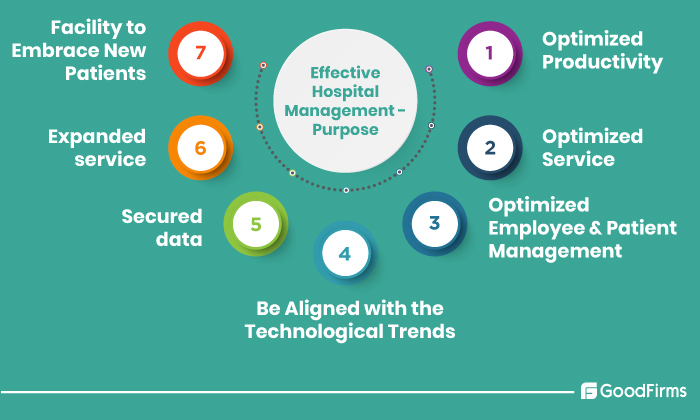
A hospital management system can collectively perform the functions of Electronic Medical Records, Dental Practice, Telemedicine, Child Care, Medical Practice Management, Medical Transcription, Medical Billing, Medical Lab, Healthcare CRM, Medical Scheduling, Accounting, etc. Through these functionalities, hospital staff can easily optimize, organize and manage their operations to serve their patients effectively.
How Can Hospital Management Software Help Hospitals and Patient Care Centers?
Hospital management software is designed to automate and efficiently manage the internal workings and processes of a healthcare institution, its employees, and its patients. It manages and integrates the data of different medical departments through a cloud or independent infrastructure. A hospital management system is a very beneficial tool for hospitals in simplifying the workflow, reducing administrative costs, preventing errors, and offering a better patient experience. Almost all healthcare professionals, including Doctors, nurses, patients, administration, clinicians, laboratories, pharmacies, etc., can benefit from an HMS.

Some of the advantages of Hospital management software are as follows:
Accounting Integration
A hospital management system offers accounting integration for handling the financial calculations and information of patients and hospitals. It manages the critical information associated with payments, hospital expenditures, payroll, and other related things. This improves financial awareness through which hospitals can analyze their performance for moving ahead in the right direction for improving revenue and cash flow. For example, an Arizona-based care center was experiencing revenue and cashflow related problems which were significantly reduced using an HMS. The care center also improved its cashflow and revenue using the tool for improving patient experience.
Appointment Scheduling
The appointment management feature of a hospital information system helps in easy appointment booking as the staff can check for doctor’s availability before assigning patients. It also allows patients to book an appointment using a web-based interface, desired by around 71% users, according to an analysis. Online appointments offer convenience and streamlined patient scheduling, besides checking consultation timings, fees, relevant doctors, etc. Many healthcare providers experience issues in streamlining their patient scheduling. A US-based healthcare provider has achieved and maintained a 99% accuracy rating in patient scheduling using HMS.
Bed Management
An HMS also benefits healthcare institutions in improving bed management. Improper bed management means unavailability of beds during needy times, hampering patient flow. Whereas with excellent bed management, hospitals and patient care centers can acquire real-time information of bed occupancy to ensure streamlined registration and discharging. It can also help ensure smooth patient flow and reduce wait times if implemented properly. Hospital bed allocation is a major challenge for many hospitals. A HMS offers a graphical representation of the beds and wards, which helps bed management staff to carry out the allocation process properly.
Claims Management
Hospital information tools also help in managing the entire claim lifecycle from one place. Using its dynamic workflow functionality, it streamlines the tasks, files, notes, and emails related to the claims. Some HMS also allows hospitals to enter the insurance details of the patients for easier claim processing, besides verifying the eligibility criterion of the patient for faster reimbursement documentation. A low zero touch claim percentage is a major challenge for healthcare firms which also impacts revenue. There are more benefits to using a hospital management software integrated with claim management functionalities. For example, an US-based independent orthopedic and Neurosurgery provider mentioned that they are using HMS for acquiring higher zero touch claim percentage without human intervention. More than 62.2% of total claims of the firm are now automated using HMS, says a report.
Inventory Management
Hospital management software can also perform the functions of inventory management. Right from saving time to control the supplies, till automating every workflow of the inventory management processes, a HMS can act as a great support. Issues associated with stolen and lost inventory can also be reduced drastically through a HMS. To quote a beneficiary - a US-based hospital dropped their lost or stolen inventory issues from 13.8% to 0% leading to a huge cost saving annually. This is possible with the best HMS software.
In/Out-Patient Management
Another major advantage of HMS is in/out-patient management for serving patients better while reducing the workload. As a single platform, the software facilitates hospitals to efficiently manage patient registration and discharge. Proper in and out-patient management could help reduce patient wait times and improve care coordination, bed management, medications, billing, insurance, etc. A typical case study for this would be the leading Israel-based hospital that encountered several issues associated with patient registration and waiting queue. For this, the hospital opted for hospital management software which reduced the average waiting time by 15%.
Medical Billing
Healthcare institutions regularly deal with different types of bills related to testing, diagnostics, and treatment. It is a complicated task for the administration to easily handle and track these bills, particularly during peak hours. In such cases, hospitals can use HMS for quick and easy handling of the bills, payments and dispatch of bills. An inadequate medical billing process can lead to excessive delays in payments. Tools like Athena offer patient outreach messaging service through which patients can make 21% faster payments. It also offers customized alerts for due payments to patients.
OT Planning & Scheduling
Scheduling operations in a hospital can be a bit challenging considering the planned ones and the number of emergencies arriving on a day-to-day basis. A recent report indicates that the cost of waiting and late surgery are the common problems seen in several hospitals. A fully-powered next generation Hospital management software can help hospitals to ease operations scheduling, booking of the OT, resource optimization, etc. It is widely used by medical practitioners for checking the availability of the OT, to avoid overlapping. A few HMS also send notifications and reminders to doctors/nurses on the planned surgeries.
Patient Records
Hospital management systems that have migrated to digitization are known for digitally maintaining patient records. These can maintain relevant patient information such as demographics, diagnostics, prescriptions, lab reports, vitals, billing, etc. This helps in reducing the chances of duplication or errors in the medical records of patients. For example, a South Africa-based leading healthcare provider was experiencing some challenges associated with health record management. A vendor of the HMS helped them with a centralized platform through which doctors can easily gain access to patient records to understand their demographics, conditions, on-going treatments and much more with clarity.
Physician Management
Care management is a primary concern for several healthcare centers as any mismanagement could lead to circumstances where a physician can miss taking care of a patient. Right investment in care management can lead to enhanced patient care quality. Physician practice management software also enables hospitals to efficiently manage different doctors, physicians, both regular and specialists. It provides information regarding the availability of doctors. Through this, appointments can be booked according to the physician's schedule and availability, besides assigning emergency cases to the available physicians. It is also helpful in tracking the performance and productivity of physicians for making any improvements if needed.
Ward Management
Hospital Ward management is a critical factor of good patient care. A systematic approach towards this will benefit both patients and the hospitals. HMS offers a centralized platform to the hospitals for managing different aspects of wards, including assigning patients, bed allocation, nurse scheduling, resource management, etc. It also helps in improving the coordination and communication among the ward staff while enhancing patient safety and experience.
Pharmacy management
Most HMS comes with a pharmacy management module to manage the stock of drugs and medicines. It administers the medicines needed for admitted patients so that unavailability of life-saving drugs can be identified. Also, issues associated with lost and expired medicines can be drastically reduced using an HMS. An Indian multispecialty hospital increased its revenue by 20% by identifying expiring medicines through HMS.
10 Key Questions to Ask a Vendor Before Investing in a HMS
Q1. What are the functionalities and benefits offered by your Hosptial management software?
Any institution, regardless of size or industry, should focus on the top features when purchasing any tool. It should ask the vendor about the functionalities of the hospital administration software and how it can benefit the hospital. The hospital management software should have an essential set of features, as outlined in the previous section.
The hospital management should also check whether the software fulfills the special practices and treatment needs or not.
Criticality of having the right features
Right features can improve productivity, which is the main reason behind any software selection, as 37% of businesses stated. These also ensure that the software can meet the highest quality and performance standards allowing the hospitals to attain pre-determined goals with utmost efficiency and productivity. By selecting HMS software with the right features, businesses can eliminate the need for dependence on other software, which significantly reduces costs. For example, ERP software with human resource and customer management functionalities can eliminate the use of CRM and HRM systems, reducing operational costs.
Q2. What are the deployment options of your HMS?
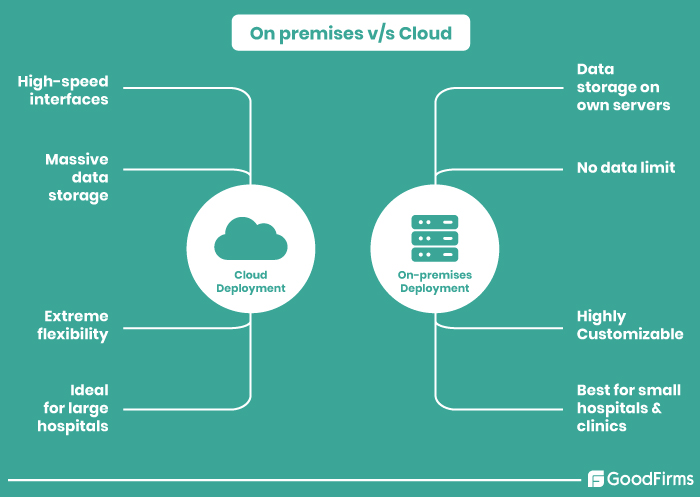
A hospital management system is mainly deployed in two ways, i.e., cloud or on-premises. On-premises systems are highly customizable and can be installed within the hospital premises with no data limit. On-premises systems are best for small hospitals and clinics that wish to keep their data to themselves. In contrast, cloud-based hospital management tools are ideal for large hospitals desiring high-speed interfaces, massive data storage, and extreme flexibility. Cloud-based ERP may be expensive but still 48% organizations are planning to migrate 50% or more applications to cloud owing to the benefits. Some third-party ERP systems can also be accessed through a website from anywhere. The hospital should identify its requirements and select the appropriate deployment option for optimum performance.
Q3. What is the implementation time of the HMS?
The implementation time for hospital management software varies with the vendor. It may take weeks to months based on the institution's size, the tool's complexity, existing infrastructure configurations, etc. A hospital management system is implemented into certain phases, such as software installation, data migration, user configurations and training, etc. Hospital management must inquire about the total time consumed in complete installation. Systems designed for small hospitals and clinics are usually installed within weeks. It can take months for larger hospitals due to the many complexities involved.
Q4. What is the cost of the HMS? Are there any running, hidden, and recurring expenses?
Cost is a notable factor for any firm desiring to invest in software. It can vary with the vendor based on certain factors, including hospital size, number of users, deployment type, additional modules, etc. Some vendors provide per-user pricing, whereas others offer tailored pricing packages. Vendors also charge some installation fees apart from subscription fees. The users must ensure that they get a value-based return on investment in the long and short term.
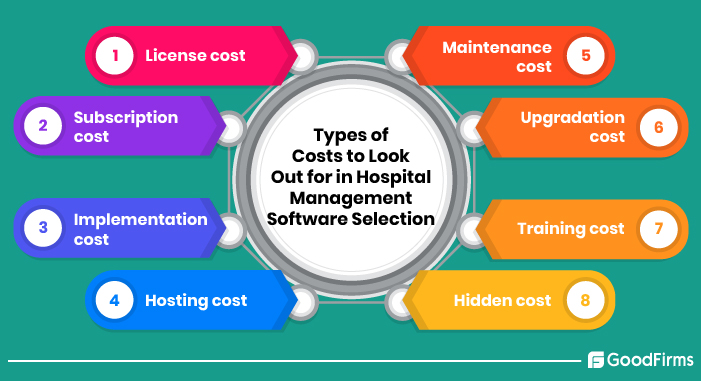
Sometimes, apart from subscription and installation fees, some hidden costs are associated with maintenance, hosting, training, and upgradation. These hidden costs may be recurring or running as per the vendor’s policies. One should inquire about such expenses to determine the overall budget consumed in the purchase.
Q5. What all devices does the HMS software support?

Digital technologies have made significant advancements giving rise to new devices, such as mobile phones, tablets, laptops, wearable devices, etc. Most of these devices come in Android, iOS, macOS, and Windows operating systems that support health applications and are even widely used by patients and medical professionals. In a study, 77% patients feel positive about medical professionals using mobile devices for patient care, treatment monitoring, electronic health record notifications, tracking health information, etc. So hospital administration should check the list of supporting devices with the vendor. Many hospital management tools also offer a lighter version for mobile devices for easy and quick access.
Q6. Do you provide the required support and assistance for training the users and resolving the queries?
Whether you have your own IT team or not, remember to ask about technical support and training assistance offered on purchasing your software purchase. Ensuring this can lead to reduced costs, as workforce training is an expensive task. Moreover, most vendors employ more people in sales than support, which means poor customer service. Therefore, it is critical to clearly understand how much help they can expect from the vendor in case of implementation and operational issues.
Another question to ask the vendor is about the average time in query resolution and workforce training. Ask if they provide self-service options like FAQ lists, educational resources, community forums, etc.
Q7. How secure is the hospital management software? Will it protect patients' and hospital data?
The data threats in healthcare have doubled over the last three years owing to weak security and infrastructure. Data safety and security are significant concerns for everyone, including hospitals, staff, and patients. Hospitals have access to multiple types of treatment data, which can cause great trouble for patients and management if compromised. This concern becomes severe in the case of cloud systems which are more vulnerable to cyber threats.
Personal health records of some people are more valuable on the dark web than money and credit card numbers. Find out about the security measures such as two-factor authorization, recovery options, etc. One can also ask about how often the security patches are fixed. Inquiry about significant data breaches can also be discussed with the vendor.
Q8. What is the scalability scope of your software? Can it accommodate future growth?
Scalability is one of the most critical attributes of software. It must withstand business growth over time. It must also handle the peak time when patients are overwhelming in numbers. With a scalable system, hospitals can foster a continuous healthy environment for better patient care irrespective of numbers. Initially, healthcare organizations don’t experience scalability issues, but the software starts restricting their ability to operate seamlessly after a few years. With the hospital’s growth, the system becomes a bottleneck if it is not scalable enough.
Q9. Which type of add-ons and customizations are supported by your software?
Off-the-shelf HMS comes with default settings readily available for instant use. It is cost-effective, but customizations are beneficial in accomplishing better results. The vendor should clearly state the type of add-ons and integrations supported by the software. A hospital may need integration with testing facilities, blood banks, pharmacies, etc. The management should ensure whether such add-ons and integrations are available or not. One should also inquire about the modules for doctors, patients, and management.
These add-ons and integrations significantly reduce the manual work and chances of data errors while automating the workflow. The customizations are also fruitful in configuring the software as per the staff working capacities and the latest technologies. Some processes are also specific to specialist hospitals and research centers. Management of the hospital should ensure that such processes can be managed or customized in the chosen tool.
Q10. Will it support integrations with existing technologies and other systems of the hospital?
At present, healthcare institutions are utilizing various technologies and tools for carrying out their daily tasks, such as tracking test results, fetching patient records, etc. Therefore, one should ensure from the vendor that the hospital management software can integrate with these existing tools and technologies. Inadequate technology integration with day-to-day processes is a major challenge experienced by 64% institutions, as mentioned by a survey study. Proper integration with existing organizational functions is essential in eliminating the need to dismantle existing infrastructure, the last thing anyone wants. Through this, hospitals can save additional efforts and resources, resulting in more productivity and efficiency.
Investing in a Hospital management system - Further considerations:
Apart from cost, features, deployment, and services, there are some other considerations for the hospital to shortlist a software:
-
Reviews
-
Quality - Ease of Use
-
Value Proposition
-
Reliability
-
Ability to customize
-
Background of the company
-
Years of Experience in the specific domain
-
Market penetration
-
Trustability
Finally, hospitals and healthcare centers looking to invest in a hospital management system should take time to analyze the above-mentioned points, evaluate at least 5-6 vendors.
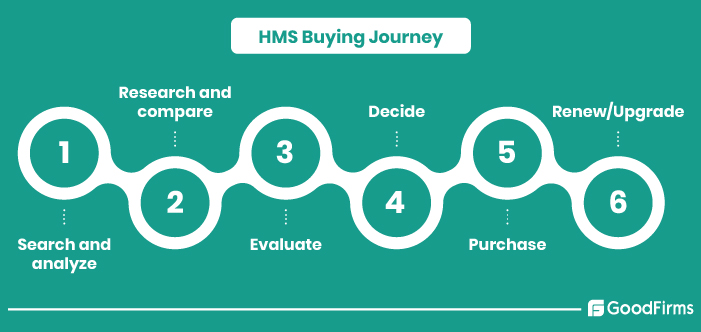
B2B reviews and ratings companies like Goodfirms can be a one-stop solution as it simplifies all the above steps. It allows you to compare, gather the right information, read reviews, check the ratings and much more quickly from one single platform, and make the right decision quickly.
What the Future Holds for Hospital Management Software
There are various findings that indicate that the healthcare providers and employees spend more time on administrative tasks, with a minimal understanding of the task and its management. However, with the availability of advanced, next-generation hospital task management tools, and algorithms there has been workflow improvement and efficient management of tasks. The implementation rate of hospital management software in healthcare institutions is rapidly growing, owing to which the global hospital management software market is anticipated to grow at a CAGR of 17.4% from 2023 to 2030. If everything goes well, future hospitals will look different and transformed. Integration of rapidly evolving technologies, increasing consumerism, economic stability, and demographic changes will tremendously drive this transformation.
Technologies such as the Internet of Medical Things, cloud adoption, artificial intelligence, virtual reality, etc., will further improve the functioning of these tools for better accuracy and efficiency, along with serving personalized medical treatment. The Internet of Medical Things could help easily connect numerous health equipment through a HMS. This allows management to acquire real-time health data in a more sophisticated and advanced manner. Cloud adoption will enable quick and secure access to data in hospitals.
Artificial intelligence in healthcare could help the market reach $187.95 billion by 2030. This massive growth will be seen due to increased uses of AI to improve medical data analyses, detect diseases, patient interaction, etc.
“AI helps to Identify, Standardize, Uncover, Measure, Optimize (ISUMO).”
In addition, these technologies will profoundly help reduce the challenges associated with data security, implementation cost, staff training, installation time, etc. Reduction in these challenges will empower the hospital management to focus on serving the patients without any technological hindrance. Keeping the demand in mind, vendors are equally focusing on improving the interoperability, usability, and security of their hospital management software.








